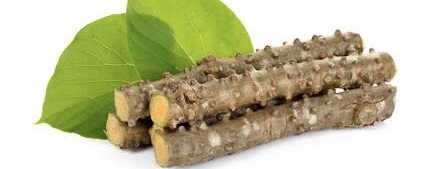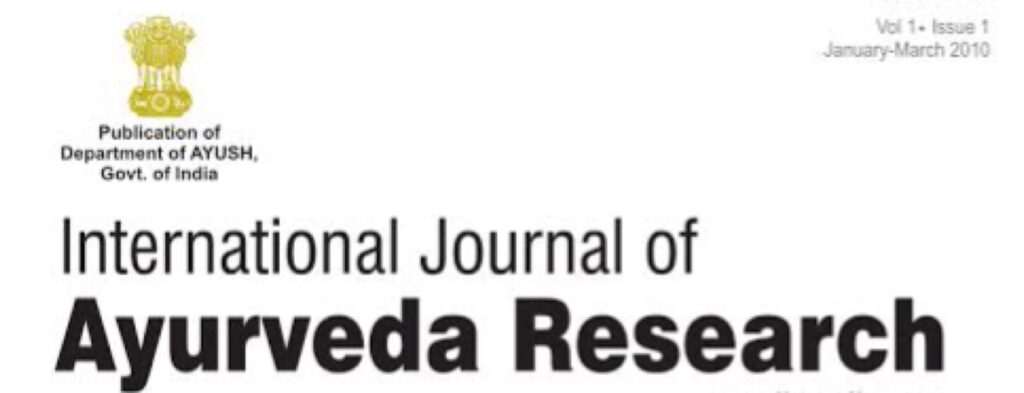
Immunomodulatory property:

Tinospora cordifolia (Giloye)
By International Journal of AYURVEDA RESEARCH – IJAR
The immuomodulatory property of Tinospora cordifolia is well documented. Active compounds 11-hydroxymustakone, N-methyl-2-pyrrolidone, N-formylannonain, cordifolioside A, magnoflorine, tinocordiside and syringin has been reported to have potential immunomodulatory and cytotoxic effects. They have been reported to function by boosting the phagocytic activity of macrophages, production of reactive oxygen species (ROS) in human neutrophil cells, enhancement in nitric oxide (NO) production by stimulation of splenocytes and macrophages indicative of anti-tumor effects. Aqueous Tinospora extracts has been also reported to influence the cytokine production, mitogenicity, stimulation and activation of immune effector cells. In mice, Tinospora cordifolia extracts has been shown to result in up-regulation of IL-6 cytokine, resulting in acute reactions to injury, inflammation, activation of cytotoxic T cells, and B cell differentiation. Active compounds in aqueous extracts like alkaloids, di-terpenoid lactones, glycosides, steroids, sesquiterpenoid, phenolics, aliphatic compounds or polysaccharides in experimental rat model have been reported for their cytotoxic action. Dry stem crude extracts of Tinospora cordifolia with a polyclonal B cell mitogen, G1-4A on binding to macrophages have been reported to enhance immune response in mice by inducing secretion of IL-1, together with activation of macrophages. Reports onTinospora cordifolia in prevention of oxidative damage also exist. The (1,4)-alpha-d-glucan (alpha-d-glucan), derived Tinospora cordifolia have been shown to activate human lymphocytes with downstream synthesis of the pro- and anti-inflammatory cytokines, invitro. Synergistic effects of compounds in the immunomodulatory activity of Tinospora cordifolia are reported.
Hepato-protective Activity
By International Journal of AYURVEDA RESEARCH – IJAR

Various Ayurvedic preparations of T. corfifolia are indicated in pandu (anemia) and kamla (jaundice). A clinical study has shown that Guduchi plays an important role in normalization of altered liver functions (ALT, AST).[80] The antihepatotoxic activity of T. cordifolia has been demonstrated in CCl4induced liver damage, normallising liver function as assessed by morphological, biochemical (SGPT, SGOT, serum alkaline phosphatase, serum bilirubin) and functional (pentobarbitone sleep time) tests. T. cordifolia revealed hepatoprotective action in goats.[81] A significant increment in the functional capacities of rat peritoneal macrophages was observed following T. cordifolia treatment.[82] Addition of extract for the first 6 weeks to chloroquine showed regression of spleen by 37% to 50% after 6 weeks and 45% to 69% after 6 months from the start of treatment. Likewise, decrease in IgM and increase in Hb, as well as wellbeing (Karnofsky performance scale), were observed.[83] T. cordifolia prevents antitubercular drugs[84,85] and bile salts[86] induced hepatic damage, x and obstructive jaundice.[87] The extract has also exhibited in vitro inactivating property against hepatitis B and E surface antigens in 48 to 72 hours.[88]
LEARNING AND MEMORY ENHANCING ACTION:
Tinospora Cordifolia (Thunb): An Indispensable and Standardized Herb Parul Grover and Gulshan Bansal* Department of Pharmaceutical Sciences and Drug Research, Punjabi University, Patiala – 147002, India
Double blind, randomized placebo controlled 21 days clinical study on 30 healthy volunteers (age 18-30 years) using T. cordifolia has been reported for learning and memory enhancing activities through a battery of psychological tests aimed at studying visual memory, logical memory, verbal memory, attention span, and concentration[130]. The herb showed a significant increase in verbal learning and memory and logical memory of immediate and short term type without any significant untoward effects.
